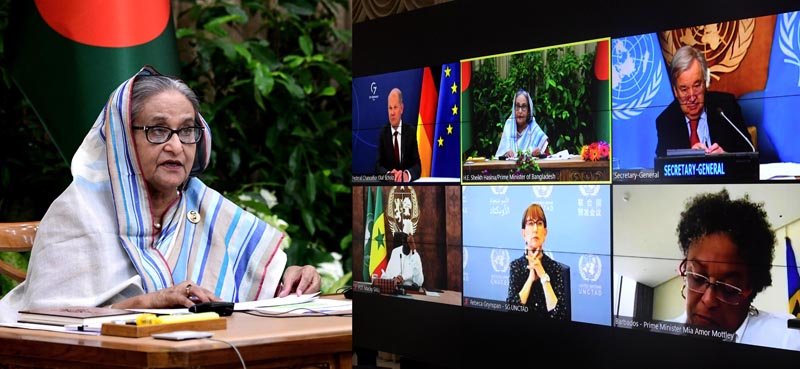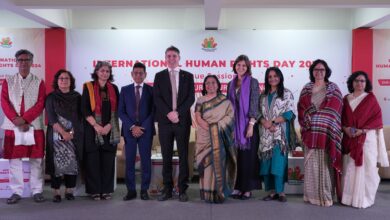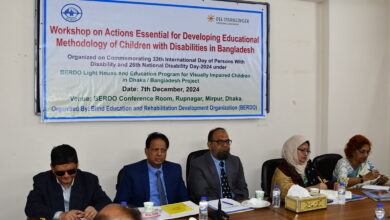PM for well-coordinated global efforts to overcome food, energy, financial crises

Prime Minister Sheikh Hasina has called for strengthening global solidarity and adopting a well-coordinated response against the food, energy and financial crises resulting from Russia-Ukraine war and Covid-19 pandemic, placing four proposals to tackle the situation.
“The war in Ukraine comes at a time when the world is still struggling to recover from the COVID-19 pandemic. It has added serious stress on the already fragile global economy,” she said.
The Prime Minister was addressing, from her official Ganabhaban residence, the first high level meeting of the Champions of “Global Crisis Response Group-GCRG” held on virtual platform on Friday.
Sheikh Hasina sought effective role of the advanced economies and financial institutions to face the crisis in an effective way.
She said the Russia-Ukraine war made the situation extremely volatile, while the short supply and unusual price hike of food, fuel and other commodities already put serious strain on the lives of the common people.
The LDCs and SIDs are bearing the heaviest brunt and they need immediate and targeted support measures to overcome this situation, she said.
She urged the advanced economies and multilateral financial institutions to come forward and grant duty-free-quota-free market access, and more accessible financing.
UN Secretary General Antonio Guterres has formed the group aimed at facing the ongoing global crisis arising out due to Ukraine-Russia war and the Covid-19 pandemic.
Against the backdrop of the global crisis, Sheikh Hasina placed four proposals to overcome the situation.
In the first proposal, she said, “First, we must strengthen global solidarity and adopt a well-coordinated response. The G-7, G-20, OECD, and international financial institutions have a crucial role to play.”
The Prime Minister said she is happy to see the Steering Committee of this Group comprises all the major financial institutions.
“We will lend our full support to their efforts for tailoring actionable recommendations to tackle the crisis,” she added.
Secondly, she said, the immediate need is to address disruptions of global logistics and supply chains.
“This will help control the rising commodity price. There must also be targeted international support to revitalize global trade and export earnings, especially of the LDCs and other vulnerable countries,” she added.
The advanced economies and multilateral financial institutions have to come forward and grant duty-free-quota-free market access, and more accessible financing, she said.
In the third proposal, she said it is imperative to put more focus on increased technology support and investments for agricultural sector, for effective food storage and distribution systems.
There are also many untapped business opportunities in the renewable energy field, especially in the LDCs, she stated.
“We can leverage the existing north-south, south-south, and triangular cooperation to advance these agenda. Engagement with the private sector is also going to be critical in this regard,” she opined.
Finally, she said, as the President of the 48-member Climate Vulnerable Forum, “We have had the opportunity to work with many SIDs and low-lying climate vulnerable countries.
“In those countries, agro-food system is under serious stress, she added.
The Prime Minister thanked the UN Secretary General for inviting het at the meeting, saying that Bangladesh is a strong believer of multilateralism.
“We have always responded to the UN’s call to contribute to global peace, stability, and development. Our commitment to support this Group stems from that conviction,” she said.
As a nation, she said, they are known for resilience against the most daunting challenges, adding that the COVID-19 pandemic is its latest example.
“Our pandemic recovery efforts were marked by a careful balance between protecting lives and livelihoods,” she said.
“We put the most vulnerable people at the forefront of our recovery efforts. We widened the coverage of social protection to support those who are the furthest behind,” she added.
Timely measures to procure vaccines, helped her country avert a major health crisis and saved lives, she opined.
“We also took pragmatic initiatives to support our export sector and SMEs. Stimulus packages worth 23 billion US dollars were rolled out. And these measures helped us achieve a 6.94 per cent GDP growth rate in the last fiscal year,” said the premier.
She said Bangladesh has attained self-sufficiency in food production and ensured energy security.
As a representative of the global South, she said, “I bring to the table the voices of the millions of people who are the most affected due to this crisis.”
“Our national development journey has led to many innovative climate actions,” she said.
“We wish to share our knowledge, understanding, and experience in addressing the challenges of climate change, bio-diversity loss and environmental degradation for the benefits of other,” she added.
Sheikh Hasina has spelled out her government’s measures to tackle Covid-19 pandemic situation as the UN secretary general wanted to know about Bangladesh’s steps to this end.
The premier said her government has taken a number of measures to face the situation arising out of the pandemic.
The measures included expanding social-safety-net programmes and reaching food and cash to over 10 million people on a regular basis, she said.
She said programmes were also taken to sell consumer items like edible oil, pulses and sugar at subsidized prices (with up to 30 to 50 percent price cut) among 10 million marginal people through issuing cards.
Besides, she said, her government has strengthened domestic food procuring drive to ensure food security by exploring multiple sources.
Sheikh Hasina said her government has distributed fertilizers among farmers and giving price support up to 85 percent to increase food production.
She said they have discouraged import of luxury items to reduce pressure on Forex reserve alongside imposing restrictions on foreign trips of officials.
The premier said the government is giving 2.5 percent cash incentive for remittance sent through proper channels.





